
A new container ship design featuring LNG-fuelled propulsion, optimised hull and efficient cargo handling demonstrates that vessels can be both environment-friendly and economic to operate.
“The earlier we are consulted during the design of a container ship, the greater the benefits for all concerned,” says Ari Viitanen, Dry Cargo Sales Director at Cargotec. “So we are excited to be involved with the STREAM development concept, which is initially for a 4,200 TEU and a wide-bodied 5,000 TEU fully cellular, open-top, LNG fuelled container vessel.” The design was developed by IPP Ingenieur Partner Pool in Germany and the innovative container stowing concept was developed jointly by experts from Cargotec and TECHNOLOG, which is part of the German engineering alliance. It has been approved by Germanischer Lloyd.
TECHNOLOG now markets the design and says that the container stowing concept offers significant cost saving possibilities because of the stowing mix flexibility. Patent rights have been applied for.
“There is far more to this concept than a change of fuel,” Mr Viitanen says. “It places great emphasis on optimising the efficient use of the vessel through well designed cargo stowage and handling systems. We have used our accumulated knowledge of the container trade in the design of the cargo stowage arrangements, the stack-splitting system and the lashing equipment to ensure commercial flexibility and efficient port operations.
“Our design for a ‘perfect fit’ cargo system has innovative features that enable different sized containers to be loaded in the same bay, maximising cargo carrying flexibility. I believe cargo system optimisation represents the correct approach, now and into the future.
“We need to study ever more carefully the intended purpose of a ship to determine its needs and requirements. Vessel productivity is the key and this is the most efficient way of designing vessels to minimise costs per transported unit.”
Designed for global operations, the STREAM 4200 LNG will be able to negotiate the existing Panama Canal locks and also the modified Kiel Canal. The design can be configured to suit multiple shipping routes. It is subdivided into six double 40-foot holds. The forward hold is covered to allow carriage of dangerous goods, while the remainder have an open-top design.
Deck container stacks are arranged to achieve higher stack weights than previously, and permit individual stowage patterns and loading operations for each individual cell. All 40ft container slots in the holds as well as three tiers of the deck slots have reefer connections. STREAM ships can be equipped with electrically-operated deck cranes at outfitting, or later as retrofit items.
“While this design features market leading levels of operational flexibility, we would always recommend that owners and yards consult us at an early stage to ensure that a new vessel is fully optimised for its specific routes and trading patterns,” Mr Viitanen says.
We use cookies to improve your experience. By continuing to use our site, you accept our Cookies, Privacy Policy,Terms and Conditions. Close X